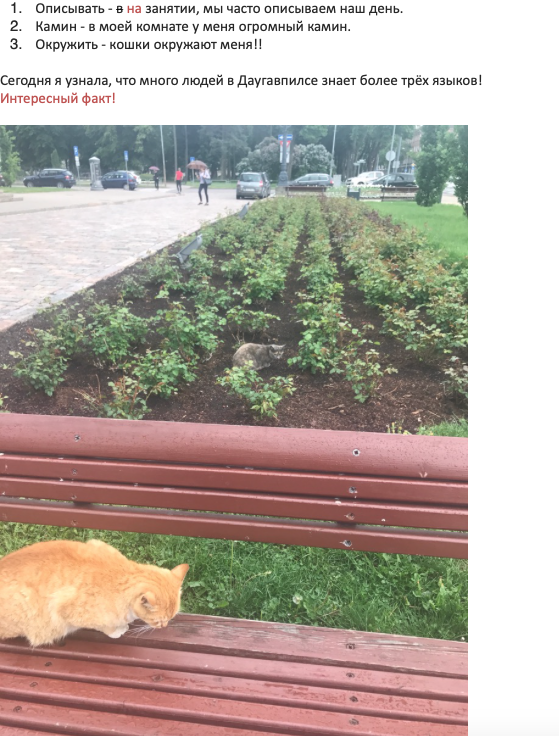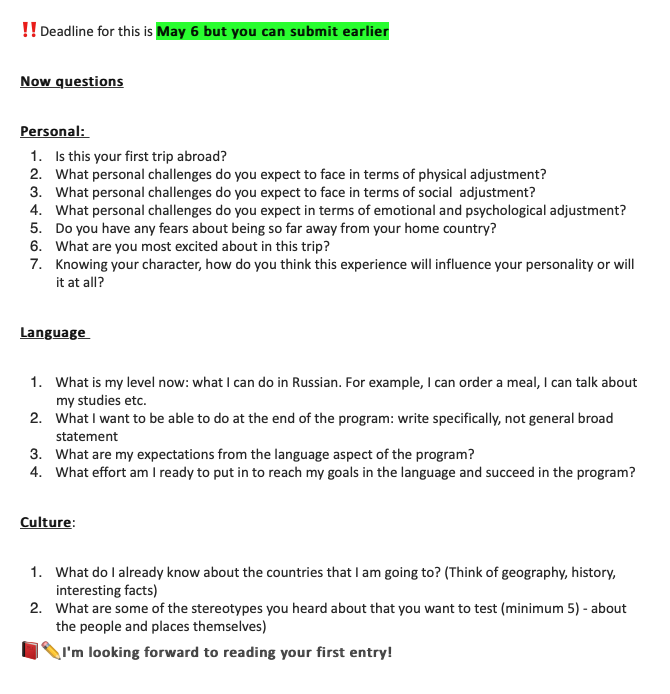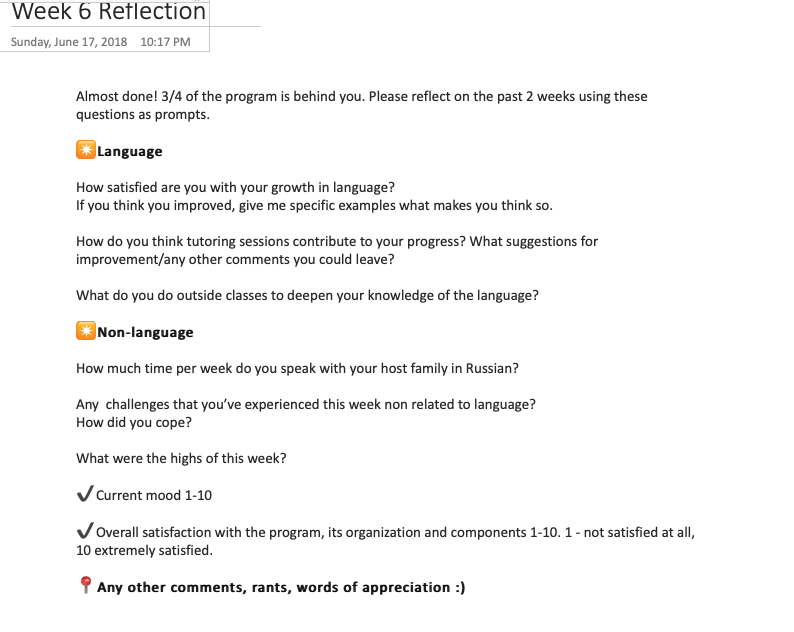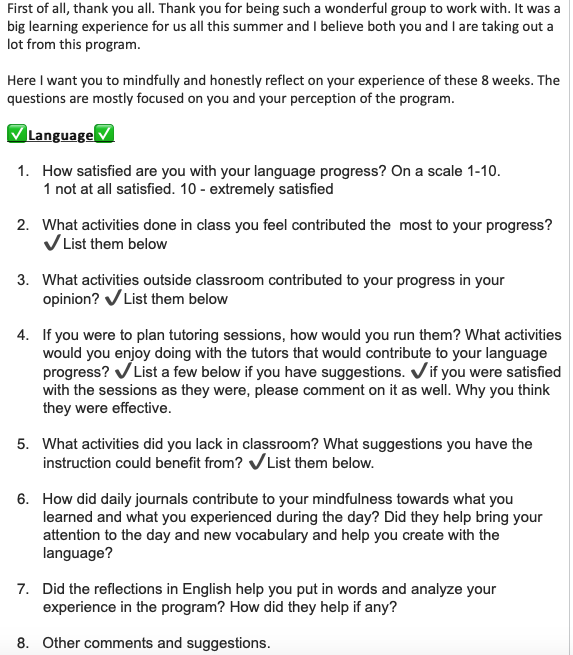Study Abroad Online Journaling: Assessing Beyond Proficiency
|
|
|
The transformative power of a study abroad experience for students is a well-established fact. Research demonstrates that study abroad trips are more than just traveling for pleasure or curiosity; students are challenged academically, culturally, emotionally, and physically (Cadd, 2015; Cohen, Paige, Shively, Ermert, & Hoff, 2005; Duke, 2000; Salisbury, An, & Pascarella, 2013; Stone, Duerden, Duffy, Hill, & Witesman, 2017). They are immersed in a profound experience which leaves a lasting impression in their lives. “As a study abroad student, you are embarking on something much richer, doing the kinds of things tourists can only dream about,” point out the authors of Maximizing the Study Abroad (Cohen et al., 2005).
In numerous studies, “the potential benefits of study abroad programs are well documented and include improved intercultural competence, increased global understanding and appreciation, identity achievement and added competitiveness for employment” (Stone, 2017, p. 23).
Journaling during study abroad programs is not a new idea, as reflecting on such a valuable period in their lives and the skills students acquire is recognized to be beneficial for the participants.
Why is reflection so important? According to Bandura, the founder of Social-Cognitive Theory, self-reflection enables humans to assess, interpret and self-evaluate their motivation, thoughts, and behavior (Bandura, 1986). In other words, self-reflection increases metacognitive awareness making the learning process more meaningful and purposeful.
In this article, we would like to share our experience running two study abroad programs in which we attempted to enhance students’ metacognitive awareness of their cultural and language learning experience. Through carefully structured online journaling, we were able to monitor students’ progress, enhance their conscious use of learning and coping strategies, and also track their psychological state throughout the program.
Part of our educational philosophy is to teach our students how to become self-directed and autonomous learners, which means developing the habit of being constantly aware of the learning goals, knowledge gaps, and strategies for filling those gaps. In other words, we strive to cultivate their metacognitive awareness.
Although we did not use any specific instruments to pre- and post-test students’ metacognition, we included some items in our final survey that asked students whether the regular self-reflection affected their awareness of the learning process and whether they felt an overall usefulness of its implementation.
As mentioned before, journaling is not a new component of a study abroad program curriculum. Its benefits were proven in many studies (Adams, 2006; Duke, 2000; Stone et al., 2017; Cohen et al., 2005). Journal writing “reinforces concepts and allows students to interpret, summarize, give examples, and suggest why certain concepts apply to certain situations” (Duke, 2000, p. 159). It is a tool of active learning where students take more control over their learning process. Keeping a journal helps students be more mindful of their experiences and remember it later. However, it takes discipline, and often students may stop doing it halfway through the program. This is one of the reasons we made journaling a mandatory component of the program and included it in the grade composition for the courses offered during our study abroad programs.
In summers 2017 and 2018, two UNG Russian study abroad programs (one in Russia, the other in the Baltics) piloted a structured journal using Microsoft OneNote application. OneNote Classroom Notebook focused on the assignments that incorporated language gain and cultural competence assessment at pre-, during and post-program stages.
The choice of using OneNote application was dictated by several reasons. This digital note-taking application developed by Microsoft is very versatile: it gathers users’ notes (handwritten and typed), drawings, screen clippings, and audio commentaries. It allows for multi-user collaboration. Other benefits include a tiered organizational system: notebooks, sections, notes; multiple pages and color coding; and rich text formatting. It is also a part of the standard Office 365 subscription for Education.
Here are step-by-step instructions for setting up a OneNote Class Notebook.

The structure of the journal was as follows. Daily entries in Russian included writing three sentences with new words or phrases learned during that day; posting a “picture of the day” and describing what was happening in the picture and why it was chosen as the picture of the day. Students were also asked to write an observation or a historical or cultural fact they learned.
Students were assigned pre-departure reflection in English followed by biweekly prompts for reflections. The final reflection in English was aimed at summing up the whole experience.
In addition to these two big assignments, students were also asked to write mini-essays after each weekend field trip or excursion and a couple of mini-essays based on the topic covered in class that week.



Without a doubt, we can say that using journals was a very effective tool during both of our programs. For the faculty, it was really helpful to track and gauge students’ morale. It also allowed us to assess the efficiency of the program’s different components while the program was in progress. Last but not least, being able to read what students struggled with and what they needed help with definitely contributed to the ability to timely address the students’ concerns.
For the students, reflections helped in keeping a record of their experiences and mood. Students’ reflective entries stimulated awareness of language and cultural gains and, most importantly, helped build trusting relations with the instructor, which is essential in these kinds of programs.
Entries in Russian improved students’ typing in Russian and narrative writing. They were a good incentive to use new vocabulary. Posting photos of the day made students notice life around them and be able to describe it in Russian as well as express themselves artistically. Daily cultural and historical facts also encouraged curiosity and breaking down stereotypes.
Overall, we consider it a successful experience and something worth using in the future (which we did this summer 2019 in Latvia, when the program director could not be on-site). The idea has its limitations though. It is definitely extra work for the students. The whole project relies significantly on students’ self-awareness. The time for tracking new vocabulary retention as well as providing feedback is rather limited. In the future, we would also like to use the opportunities of the OneNote Collaboration space more. Certain parts of the journals can definitely be used in the promotion materials or events for future study abroad programs.
References
Adams, R. (2006). Language learning strategies in the study abroad context. In M. DuFon & E. E. Churchill (Eds.), Language Learning in Study Abroad Contexts. (pp. 259–292). Channel View Publications.
Bandura, A. (1986). Social foundations of thought and action: A social cognitive theory. Englewood Cliffs: Prentice Hall.
Cadd, M. (2015). Increasing the linguistic and cultural benefits of study abroad. Language Learning Beyond the Classroom, 253–262.
Cohen, A. D., Paige, R. M., Shively, R. L., Ermert, H. A., & Hoff, J. G. (2005). Maximizing study abroad through language and culture strategies: Research on students, study abroad program professionals, and language instructors. Center for Advanced Research on Language Acquisition: University of Minnesota.
Duke, C. R. (2000). Study abroad learning activities: A synthesis and comparison. Journal of Marketing Education, 22(August), 155–165.
Salisbury, M. H., An, B. P., & Pascarella, E. T. (2013). The effect of study abroad on intercultural competence among undergraduate college students. Journal of Student Affairs Research and Practice, 50(1), 1–20.
Stone, G. A., Duerden, M. D., Duffy, L. N., Hill, B. J., & Witesman, E. M. (2017). Measurement of transformative learning in study abroad: An application of the learning activities survey. Journal of Hospitality & Tourism Education, 21, 23–32.


 Anastasiya Smith-Lakhno, Instructor of Russian, Department of Germanic and Slavic Studies at UGA
Anastasiya Smith-Lakhno, Instructor of Russian, Department of Germanic and Slavic Studies at UGA  Tatiana Maslova, Lecturer of Russian, University of North Georgia.
Tatiana Maslova, Lecturer of Russian, University of North Georgia.